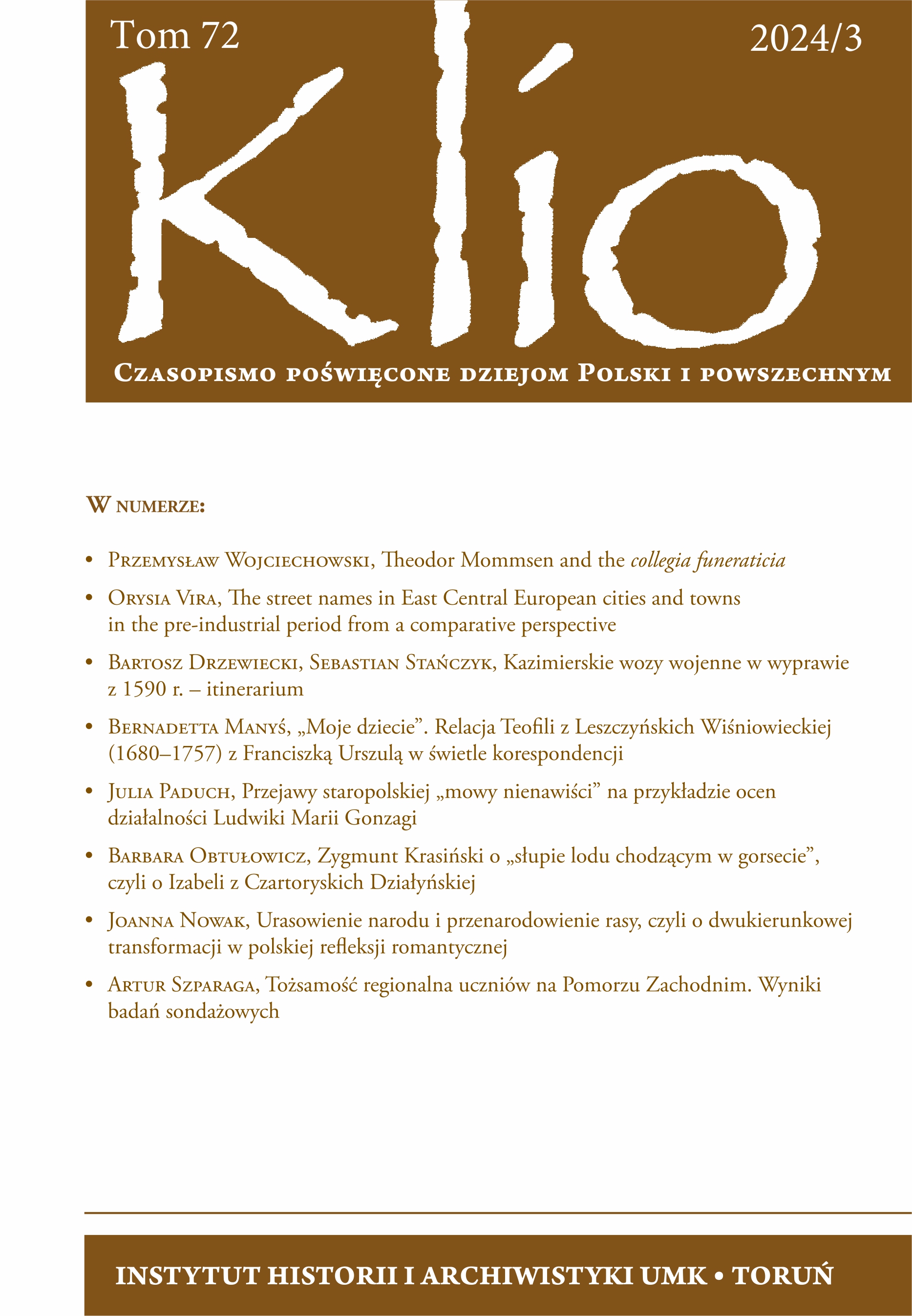Theodor Mommsen and the collegia funeraticia
Theodor Mommsen i collegia funeraticia
DOI :
https://doi.org/10.12775/KLIO.2024.040Résumé
In 1843, Theodor Mommsen completed his legal studies at the University of Kiel; in the same year, his dissertation De collegiis et sodaliciis Romanorum appeared in print. This publication, which was small in terms of volume, not only opened the door to an illustrious academic career for its author, but also had an enormous impact on the course of scholarly discussion on Roman colleges. One of the basic concepts used in this discussion is the 'funeral colleges' created by Mommsen. The main purpose of this article is to show that we are dealing with an anachronism in this case. Mommsen's proposed concept of 'funeral colleges' found very fertile ground in Germany at the time ('bürgerliche Vereinsbewegung' and Bismarck's social reforms), but it is not substantiated by the source material. None of the known Roman colleges was a 'funeral college' in the sense in which the term was used by Mommsen and his scholarly heirs. The fact that, for many colleges, helping to organise the burial of a deceased member was an important sphere of their activity does not make them 'funeral colleges'.
W 1843 roku Theodor Mommsen skończył studia prawnicze na uniwersytecie w Kilonii; w tym samym roku ukazała się drukiem jego rozprawa „De collegiis et sodaliciis Romanorum”. Ta niewielka pod względem objętości publikacja nie tylko otworzyła drzwi do wspaniałej kariery akademickiej jej autora, lecz wywarła także ogromny wpływ na przebieg dyskusji naukowej na temat rzymskiego korporacjonizmu. Jednym z podstawowych pojęć używanych w tej dyskusji są wykreowane przez Mommsena „kolegia pogrzebowe”. Głównym celem tego artykułu jest wykazanie, że mamy w tym przypadku do czynienia z anachronizmem. Zaproponowana przez Mommsena koncepcja „kolegiów pogrzebowych” trafiła na bardzo podatny grunt w ówczesnych Niemczech („bürgerliche Vereinsbewegung” i reformy społeczne Bismarcka), nie ma jednak uzasadnienia w materiale źródłowym. Żadne ze znanych rzymskich kolegiów nie było „kolegium pogrzebowym” w tym znaczeniu, w jakim tego terminu używał Mommsen i jego naukowi spadkobiercy. Fakt, że dla wielu kolegiów pomoc w zakresie organizacji pochówku zmarłego członka była ważną sferą ich aktywności, nie czyni z nich „kolegiów pogrzebowych”.
Références
R. Ascough, P. A. Harland, J. S. Kloppenborg, Associations in the Graeco-Roman World. A Sourcebook, Waco 2012.
F.M. Ausbüttel, Untersuchungen zu den Vereinen in Westen des römischen Reiches, Kallmünz 1982.
A. Bendlin, Associations, Funerals, Sociality, and Roman Law: the collegium of Diana and Antinous in Lanuvium (CIL 14.2112) Reconsidered, w: Aposteldekret und Antikes Vereinswesen: Gemeinschaft und ihre Ordnung, Hg. M. Öhler, Tübingen 2011, s. 207-295.
B. Bollmann, Römische Vereinshäuser. Untersuchungen zu den Scholae der römischen Berufs-, Kult- und Augustalen-Kollegien in Italien, Mainz 1998.
M. Buonocore, O. Diliberto, L’album e la lex della Familia Silvani di Trebula Mutuesca. Nuove considerazioni, „Atti della Pontificia Accademia Romana di Archeologia. Rendiconti” 2003, t. 75, s. 327–393.
M. Buonocore, O. Diliberto, Approfondimenti sull'album e la lex familiae Silvani da Trebula Mutuesca, “Minima Epigraphica et Papyrologica” 2006, t. 11, s. 210–254.
C. Cardinali, Diplomi imperiali di privilegi accordati ai militari, Velletri 1835.
F. Diosono, ‘Collegia’. Le associazioni professionali nel mondo romano, Roma 2007.
R. Friggeri, La collezione epigrafica del Museo Nazionale Romano, Roma 2001, s. 173-174.
P. Garofalo, ‘Lex collegii Dianae et Antinoi’ (CIL XIV 2112), Testo, traduzione e commento, Tivoli 2020.
A.E. Gordon, Album of Dated Latin Inscriptions. Rome and the Neighborhood, II, Berkeley-Los Angeles 1964.
J. Kolendo, J. Żelazowski, Teksty i pomniki. Zarys epigrafiki łacińskiej okresu Cesarstwa Rzymskiego, Warszawa 2003.
J. Liu, ‘Collegia centonariorum’: the guilds of textile dealers in the Roman West, Leiden–Boston 2009.
W. Liebenam, Zur Geschichte und Organisation des römischen Vereinswesens, Leipzig 1890.
R. Meiggs, Roman Ostia, Oxford 1973.
T. Mommsen, De collegiis et sodaliciis Romanorum, Kiel 1943.
O.M. van Nijf, The Civic World of Professional Associations in the Roman East, Amsterdam 1997.
J. S. Perry, The Roman Collegia. The Modern Evolution of an Ancient Concept, Leiden – Boston 2006.
N. Purcell, Tomb and Suburb, w: Römische Gräberstrassen: Selbstdarstellung-Status-Standard, Hgs. H. von Hesberg, P. Zanker, München 1987, s. 25–41.
J. Rives, Życie obywatelskie i religijne, w: Świadectwa epigraficzne. Historia starożytna w świetle inskrypcji, red. J. Bodel, Poznań 2008, s. 123-142.
N. Ratti, Dissertazione sopra una antica iscrizione rinvenuta nel territorio di Cività-Lavinia spettante alla citta di Lanuvio, „Dissertazioni della Pontificia Accademia romana di archeologia. Atti dell’Accademia romana di archeologia” 1825, t. 2, s. 435–462.
D. Rohde, Zwischen Individum und Stadtgemeinde. Die Integration von collegia in Haffenstäden, Mainz 2012.
S. Schrumpf, Bestattung und Bestattungswesen im römischen Reich: Ablauf, soziale Dimension und ökonomische Bedeutung der Totenfürsorge im lateinischen Westen, Göttingen 2006.
N. Tran, Les membres des associations romaines: le rang social des collegiati en Italie et en Gaules, sous le haut-empire, Rome 2006.
E. Vetter, Die ‘familia Silvani’ in Trebula Mutuesca und die ‘sectores materiarum’ in Aquileia, w: Studi aquileiesi offerti il 7 ottobre 1953 a G. Brusin nel suo 70 compleanno, Aquileia 1953, s. 93-119.
P. Wojciechowski, ‘Cultores deorum’. Stowarzyszenia religijne w Italii w okresie wczesnego cesarstwa (I-III w. n.e.), Toruń 2015.
P. Wojciechowski, Salvia Marcellina and the ‘collegium’ of Aesculapius and Hygia in Rome: some Remarks on the ‘lex Aesculapii et Hygiae’ (CIL VI 10234), “Palamedes” 2017, t. 12, s. 141-164.
P. Wojciechowski, ‘Leges collegiorum’: "statutes" of Roman private colleges in the early empire period, w: Antiquitas Aeterna, classical studies dedicated to Leszek Mrozewicz on his 70th birthday, eds. K. Balbuza, M. Duch, Z. Kaczmarek, K. Królczyk and A. Tatarkiewicz, Wiesbaden 2021, s. 497-506.
Téléchargements
Publiée
Comment citer
Numéro
Rubrique
Licence
© Przemysław Wojciechowski 2024

Ce travail est disponible sous licence Creative Commons Attribution - Pas de Modification 4.0 International.
Stats
Number of views and downloads: 727
Number of citations: 0



